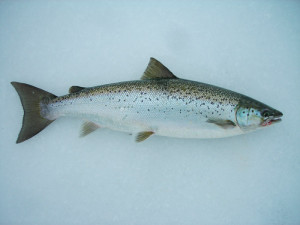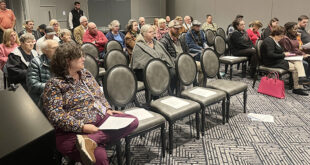By Dan Ladd, Chronicle Outdoors Editor
Once again the New York State Department of Environmental Conservation is proposing a number of fishing regulations. Allowing anglers to once again harvest rainbow smelt in Lake George is one of them.
Those with fond memories of springtime “dipping” for smelt with nets in tributaries should not get too excited. The proposal would only allow anglers to jig for them during an established open season.
It’s one of several changes put forth by DEC that, if approved, would take effect next year, the 2017-18 angler year.
Public comment is being sought through March 31 on a broad list of proposals.
The idea of allowing anglers to target smelt has been gaining momentum in recent years. Jim Pinheiro, DEC’s Region 5 Fisheries Senior Aquatic Biologist, stands behind the measure as he helped draft the proposal. “The idea is to have jigging, whether it’s on hard water or open water, to try to establish a season to remove the ability to dip, to amend the regulations to show that the use or possession of smelt was prohibited during the closed season.”
Pinheiro says the proposed season would run from May 16 through March 31, and thus be closed during the spring spawning run, typically in April when the water temperature reaches about 42 degrees. Anglers would be able to creel any size smelt with a daily limit of 25, and ice fishing would be permitted.
Rainbow smelt are not native to Lake George. They were introduced in 1918 and periodically stocked until 1974. A major forage fish for lake trout and landlocked Atlantic salmon, which are bouncing back in Lake George, the little fish were highly sought by anglers for the frying pan.
Dip nets on long poles was a common way to harvest them in abundance until the practice was banned in 1986 and it became illegal to use or possess smelt on Lake George.
Some anglers have voiced concerns that allowing smelt harvesting could have a negative impact on the rebounding salmon population, but Pinheiro is not concerned.
“I think the amount of smelt that would be harvested through the ice or during an open water season, it’s probably going to be minimal,” he said. “There’s always potential to over-harvest but, if anything, I think there’s a greater potential for us to have too many large salmonids, and they would have a much higher harvest of smelt than the anglers would.”
Pinheiro continued, “The idea was to provide an opportunity as people are interested in angling for smelt because there’s really not that many other waters where you can reasonably expect to catch smelt.
“If we keep the harvest to only angling, and not permit dipping, I think that’s where the key is. I’d really be worried if we opened it up for dipping.”
Putnam & Crane Pond proposals
A few other proposals of note include two waters in the Pharaoh Lake Wilderness. Putnam Pond, where there is a DEC Campground, could turn into a walleye fishery if things go right. But it’s not as simple as stocking a bunch of walleye, which are a delicacy to anglers.
Pinheiro said, “They have put in a stocking policy to start putting walleye in there. I’m not sure if it’s fry or fingerings, but we’re hoping to start stocking now and find out in about five years if that’s going to be a viable walleye fishery.”
Crane Pond was once open to ice fishing but was closed a few years ago. Thanks to anglers voicing their opinions, Pinheiro sees it potentially opening back up.
“We did have that open for ice fishing for years. There was a big push to simplify our regulations and there was a proposal to remove that body of water from ice fishing,” he said. “We had a significant number of people contact us and told us that they really wanted to keep Crane Pond as a wilderness ice fishing destination, where you had to hike in and spend the day fishing for lakers. We wanted to pull it out of that proposal, but it slipped through, so now we’re reversing the regulation.”
The complete list of proposals (except the Great Lakes) are mostly sorted by county on DEC’s website: http://www.dec.ny.gov/outdoor/73762.html. Again, the comment period is through March 31, 2016. Written comments can be e-mailed from the website or sent to: Shaun Keeler, at New York State DEC, Bureau of Fisheries, 625 Broadway, Albany, NY 12233-4753.
How ’bout them salmon?
Anglers are catching more and more salmon on Lake George in recent years both on the ice and in open water. Most will tell you that it’s because the state switched strains.

“We started that about five years ago,” said Pinheiro. “It’s to the point now where the vast majority of the fish in our broodstock [adult] water are the Sebego strain. A lot of those Little Clear ones are gone…All of those fish get propagated in the Lake Clear hatchery and some get transferred to the Warren County (Fish) Hatchery.”
Diary keepers needed
While the salmon and smelt reports are good news, the news is less good on the Trout and Salmon Angler Diary Program.
“We really need to have more participants in the angler diary program, specifically for Lake George,” Pinheiro said. “I have a dwindling number of cooperators in that program. I’m not getting new recruits.”
The program is simple: DEC sends a booklet small enough to fit in your pocket and you record notes about the fish you catch. Every year when DEC sends you a new diary, they’ll send an S.A.S.E to send the previous one back.
With so many area anglers willing to voice opinions about how this lake is managed, it’s surprising that fewer than a dozen participate in this program, from which data is highly analyzed and used to make a number of fisheries management decisions.
Pinheiro said he has had discussions with anglers who would like to see a better system, perhaps a cell phone app, for recording the data. DEC, however, has not indicated any change.
Pinheiro says the data is paramount to overseeing the salmonid (lake trout and salmon) fishery. “It’s important to our fisheries staff to get good information from anglers,” he said. “The information I get from the guides is key because they have a good handle of what’s going on and if it’s comparable to years past. The data is still good, it’s just that we don’t have enough of it to compare to years past.”
It’s never too late to get involved in the angler diary program. Call DEC’s Warrensburg office at 623-1200 to learn more.
Copyright © 2016 Lone Oak Publishing Co., Inc. All Rights Reserved.
 Glens Falls Chronicle Serving the Glens Falls/Lake George region; Warren, Washington and northern Saratoga counties since 1980
Glens Falls Chronicle Serving the Glens Falls/Lake George region; Warren, Washington and northern Saratoga counties since 1980


